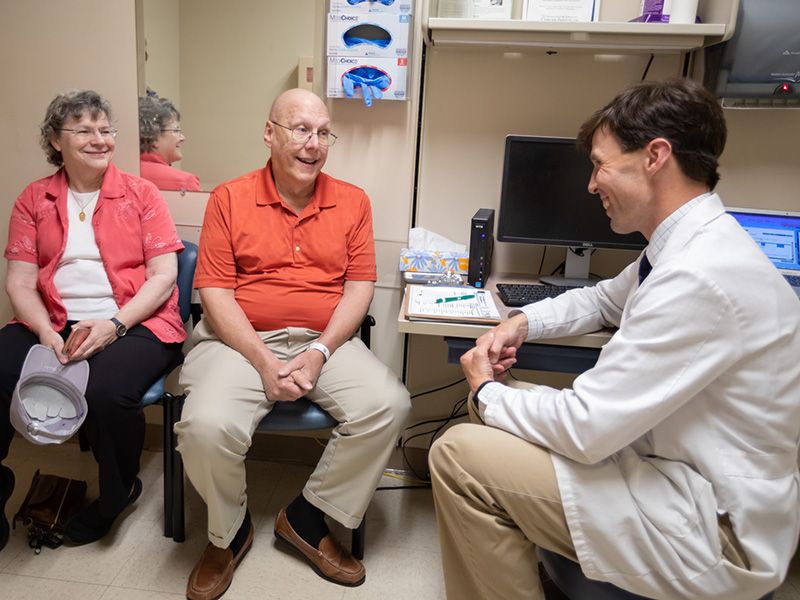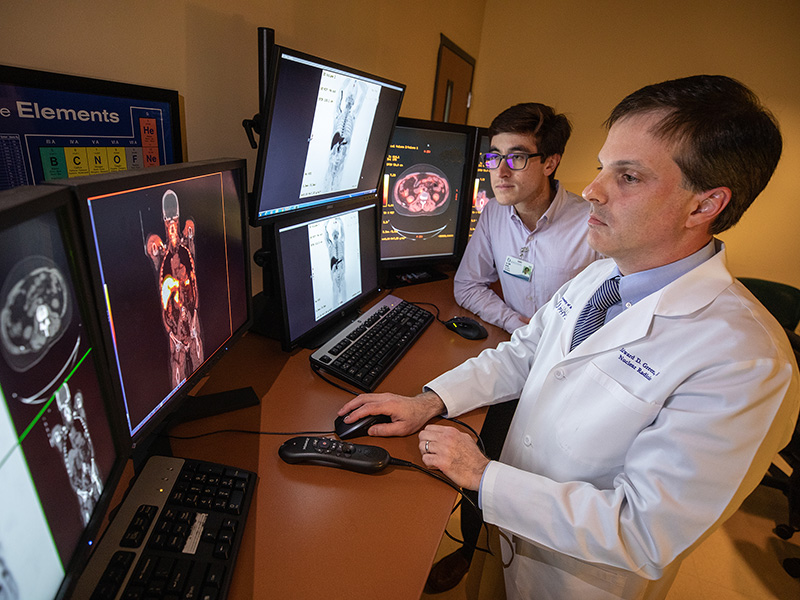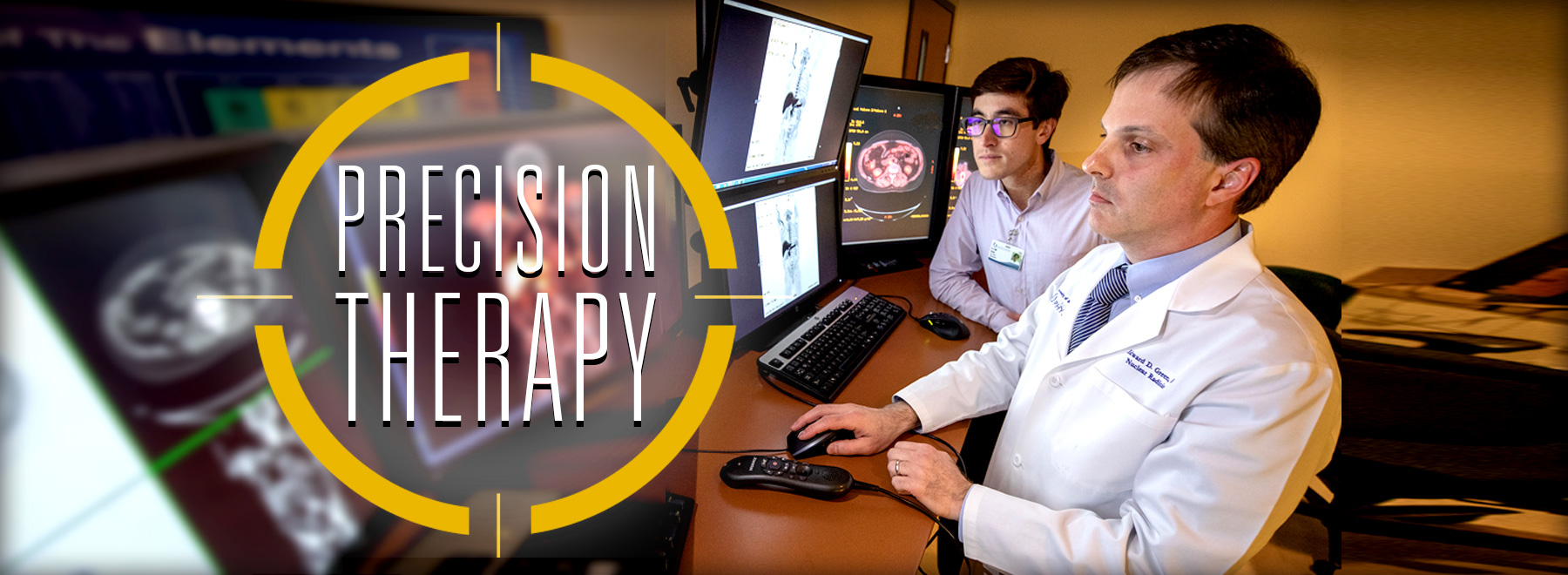Radiopharmaceuticals help CCRI team discover, treat prostate cancer
Since his diagnosis of metastatic prostate cancer, Paul Gay has sought ways to catch recurrences early when the chances of successfully treating them are better.
Diagnosed with the cancer four years ago, the Ridgeland resident recently said, “The strategy we’ve tried to follow is to keep the disease under control, to identify active cancer and treat it as we find it.”
A type of nuclear radiology imaging scan offered at the University of Mississippi Medical Center’s Cancer Center and Research Institute can help detect those recurrences earlier.
Gay is among patients most likely to benefit from the testing that uses a radiopharmaceutical and a positron emission tomography/computed tomography, or PET/CT, scan. This scan is for men with recurrent prostate cancer and may be ordered when men previously treated for prostate cancer have rising blood prostate specific antigen, or PSA, levels.
During the scan, the patient is injected with fluciclovine F18, or Axumin, and then imaged. The scan can help highlight where cancer has recurred. The CCRI offers the scan to its patients and to those referred to the center from other practices in the state.
“It may show if the cancer is recurring at a spot where the cancer originated or if it has moved further away,” said Dr. Clark Henegan, Ergon scholar and head of the CCRI’s Interdisciplinary Genitourinary Cancer Program. “Doctors would consider different therapy recommendations for local recurrence versus a more distant recurrence.

Dr. Clark Henegan, assistant professor of hematology and oncology, talks to patient Paul Gay and his wife, Dr. Hannah Gay, about results of a recent prostate cancer PET/CT scan.
“Getting the right treatment is important so we can help the patient avoid the side effects of a treatment that may not be as effective.”
If a scan has a positive finding, “we get a biopsy done to confirm, because we don’t want to over-treat based on a scan,” Henegan said.
Reading the scans is another skillset the CCRI brings to the cancer treatment table.
“It takes a dedicated nuclear radiologist to interpret the scans,” Henegan said.
“We were the first facility to offer this in the state,” said Dr. Edward Green, professor of radiology and head of the PET/CT Center. “The bottom line is to catch this much earlier than traditional imaging studies.”
Malignant and metastatic cells more readily gather the radiopharmaceutical that was injected, making them appear brighter on the digital imaging. Knowing anatomy also is key, Green said.
He follows the lymphatic drainage system from the prostate area and searches for those “hot” spots, some as small as the lead in a No. 2 pencil. He also searches the area at the prostate site and throughout the body for possible cancer return.
Green said he likes other attributes of the radiopharmaceutical:
• It’s fast. Patients are placed on the PET/CT table, intravenously injected with the radiopharmaceutical and scanned within about five minutes.
• Patients fast for only four hours before a scan and do no exercise the day before. “That’s really awesome for the patient,” Green said, noting it takes about 30 minutes from the time a patient enters the imaging room until the process is complete.

Dr. Will Berlin, a fourth-year radiology resident, left, and Dr. Edward Green, professor of radiology, review a recent PET/CT searching for any spread of prostate cancer. Green said cancer cells more readily gather the radiopharmaceutical gathers making them more apparent on the images. Since other conditions can appear brighter too, doctors recommend a biopsy in the area that may indicate recurrent cancer.
Other radiopharmaceutical drugs used for different scans may require an hour or more to circulate within the patient’s body before they can be scanned. The process starts with consistent monitoring of PSA levels, Henegan said.
Prostate cancer may have recurred if:
• A patient’s prostate was removed and they he has a detectable PSA level, or
• If he was treated with radiation therapy and has a PSA of 2 ng/mL above the patient’s lowest value.
Henegan said the CCRI team starts with a computed tomography, or CT, scan and bone scans.
“If those two do not detect cancer, we move on to the Axumin scan,” he said. “The first two are cheaper and don’t have to use the more expensive (Axumin) radiotracer.”
If the PET/CT shows possible malignancy, the CCRI team does a biopsy. If the biopsy is positive for prostate cancer, treatment choices usually include radiation therapy or chemotherapy, Henegan said.
He said offering the scans is part of the CCRI’s overall strategy of providing top-notch treatment as close to home as possible.
Gay, who was treated for prostate cancer at UMMC, went to other centers for scans in clinical trials and for this scan when it was initially FDA approved. UMMC began offering the scan in 2018.
His wife, Dr. Hannah Gay, a retired UMMC professor of pediatrics, said the convenience of getting the scan done close to home is helpful.
“It’s been a real boost for us to get the special scans here,” she said. “When his PSA rises, we can get it within a week.”
Paul Gay said he’s happy with his experience.
“We’ve had an incredible team here bringing cutting-edge treatment to people in Mississippi,” he said. “Our whole strategy is to stay alive until there’s a cure. Our doctors here bought into that and we’re trying to use every means to make that happen.
“Miracles are around every corner.”
The above article appears in CONSULT, UMMC’s monthly e-newsletter sharing news about cutting-edge clinical and health science education advances and innovative biomedical research at the Medical Center and giving you tips and suggestions on how you and the people you love can live a healthier life. Click here and enter your email address to receive CONSULT free of charge. You may cancel at any time.



